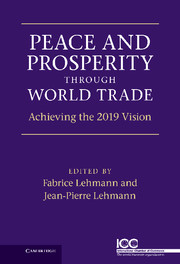Book contents
- Frontmatter
- Contents
- Notes on contributors
- Foreword
- Preface: the ICC vision
- Historical overview and dynamics
- Editorial note
- A Global systemic transformations
- B Governance of global trade
- C Poverty and global inequities
- D The long view on interlocking crises
- E Global business responsibilities
- Editorial introduction
- E1 Responsible leadership
- E2 For great leadership
- E3 A lesson on trade, regulation and competition policy?
- E4 International trade and business ethics
- E5 Who's driving twenty-first century innovation? Who should?
- E6 Responsible sourcing
- E7 Trade, international capital flows and risk management
- E8 Trade, corporate strategies and development
- E9 How can trade lead to inclusive growth?
- E10 Trade and human rights: friends or foes?
- E11 Trade: the spirit and rule of law
- Conclusion: the imperative of inclusive global growth
- Index
E4 - International trade and business ethics
Published online by Cambridge University Press: 05 July 2011
- Frontmatter
- Contents
- Notes on contributors
- Foreword
- Preface: the ICC vision
- Historical overview and dynamics
- Editorial note
- A Global systemic transformations
- B Governance of global trade
- C Poverty and global inequities
- D The long view on interlocking crises
- E Global business responsibilities
- Editorial introduction
- E1 Responsible leadership
- E2 For great leadership
- E3 A lesson on trade, regulation and competition policy?
- E4 International trade and business ethics
- E5 Who's driving twenty-first century innovation? Who should?
- E6 Responsible sourcing
- E7 Trade, international capital flows and risk management
- E8 Trade, corporate strategies and development
- E9 How can trade lead to inclusive growth?
- E10 Trade and human rights: friends or foes?
- E11 Trade: the spirit and rule of law
- Conclusion: the imperative of inclusive global growth
- Index
Summary
In November 2006, 200 German policemen and prosecutors raided 30 offices and homes of Siemens managers to investigate allegations of embezzlement at Siemens' fixed-line phone unit. Six suspects were arrested, among them current and former high-ranking managers. In 2007 a German court fined Siemens €201 million in relation to illegal payments of €12 million made by its information and communication business unit to government officials in Nigeria, Russia and Libya. At the same time prosecutors in at least ten countries, including the USA, were investigating allegations that Europe's largest engineering company by sales had bribed officials to win big infrastructure contracts around the globe.
Also in 2007, in the wake of internal investigations started at the end of 2006, Siemens finally admitted to having identified dubious payments amounting to €1.3 billion from the years 1999 to 2006. As a result, the ‘trains-to-light bulbs’ conglomerate replaced all but one of its managing board members.
On 15 December Siemens pleaded guilty to charges of bribery and corruption and agreed to pay US$350 million in disgorgement to the SEC. In related actions, Siemens paid a US$450 million criminal fine to the US Department of Justice and a fine of €395 million to the Office of the Prosecutor General in Munich, Germany, on top of the earlier €201 million.
- Type
- Chapter
- Information
- Peace and Prosperity through World TradeAchieving the 2019 Vision, pp. 249 - 252Publisher: Cambridge University PressPrint publication year: 2010

